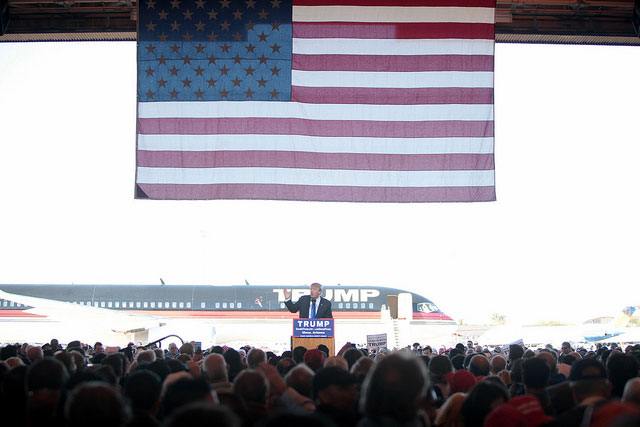
Part of the Series
Beyond the Sound Bites: Election 2016
Honest, paywall-free news is rare. Please support our boldly independent journalism with a donation of any size.
Donald Trump seems to have driven a substantial portion of the media into a frenzy with his anti-trade rhetoric. While much of what Trump says is wrong, and his solutions are at best ill-defined, the response in the press has largely been dishonest.
For example, a New York Times editorial tried to imply that there was an ambiguous relationship between the size of the trade deficit and employment in manufacturing. It pointed out that Japan and Germany, both countries with trade surpluses, had seen a comparable percentage decline in the number of workers employed in manufacturing as the United States over the last quarter-century.
What the editorial for some reason chose to ignore was that Japan and Germany have seen near-stagnant labor force growth over the last quarter-century. Other things equal, we should therefore expect to see a smaller increase or larger percentage point decline in manufacturing jobs in these countries than in the United States, where the labor force has grown by more than 25 percent over this period.
The editorial also neglected to mention that Japan now has just under 17 percent of its workforce employed in manufacturing, while in Germany the share is almost 20 percent. This compares to 8.6 percent in the United States. If the United States had the same share of its workforce employed in manufacturing as Japan, we would have another 11 million manufacturing jobs. If we had the same share as Germany, we would have another 16 million manufacturing jobs. That would make a huge difference in the US labor market.
There are some simple and undeniable points about the pattern of trade over the last quarter-century. First, trade has cost the United States a large number of manufacturing jobs. Second, the loss of manufacturing jobs has been bad news for the less-educated segment of the workforce, essentially the 60 percent of workers without college degrees. Manufacturing employment has historically been a source of relatively good-paying jobs for this group, so the loss of these jobs has put downward pressure on the wages of this group more generally.
Finally, in the context of a below full-employment economy (a.k.a. “secular stagnation”), a trade deficit reduces overall employment and output. In a fully employed economy we can envision the loss of demand due to a trade deficit leading to lower interest rates, thereby stimulating investment and consumption. That doesn’t happen when we are looking at near zero interest rates.
Anyhow, it is possible to accept these facts and still argue that the pattern of trade over this period has been a net benefit to the country. But denying these facts is the sort of thing we would expect from Donald Trump, not people engaged in a serious policy debate.
If we want to discuss trade more seriously, we would also ask about what barriers have been left in place. Is there really no way someone can be qualified to be a doctor unless they have completed a residency program in the United States? We would save roughly $100 billion a year (at $700 per family) if we paid our doctors the same amount as doctors in Germany and Canada. There are similar restrictions that protect dentists and other highly paid professionals from international competition.
The fact that highly educated workers have been “winners” in the global economy was less due to their education and skill, and more the result of their ability to use political power to protect their occupations. In the same vein, a major part of recent trade agreements has been stronger and longer patent and copyright protection.
These government granted monopolies are forms of protectionism that are equivalent to tariffs of several hundred or thousand percent on the protected items. This is a huge deal economically and often a matter of life and death when it comes to patent protection on prescription drugs. There are more efficient mechanisms for financing innovation and creative work, but the pharmaceutical and entertainment industry don’t want the discussion because they don’t want to jeopardize the protectionism that benefits them.
Donald Trump is a hateful bigot, but that doesn’t mean that everything he says is wrong. It would be a huge step forward if his critics could acknowledge that the recent pattern of trade has been harmful to large segments of the population. Furthermore, this is due to the way trade policy was designed, not the uncontrollable forces of globalization.
If respectable leaders in politics and the media continue to repeat glib clichés rather than taking the economic reality of trade policy seriously, it should not be surprising that the victims of trade will look to demagogues like Trump. It is unfortunate when we get a more honest discussion of a major policy issue from Donald Trump than the New York Times.
Trump is silencing political dissent. We appeal for your support.
Progressive nonprofits are the latest target caught in Trump’s crosshairs. With the aim of eliminating political opposition, Trump and his sycophants are working to curb government funding, constrain private foundations, and even cut tax-exempt status from organizations he dislikes.
We’re concerned, because Truthout is not immune to such bad-faith attacks.
We can only resist Trump’s attacks by cultivating a strong base of support. The right-wing mediasphere is funded comfortably by billionaire owners and venture capitalist philanthropists. At Truthout, we have you.
Truthout has launched a fundraiser, and we have only 72 hours left to raise $25,000. Please take a meaningful action in the fight against authoritarianism: make a one-time or monthly donation to Truthout. If you have the means, please dig deep.